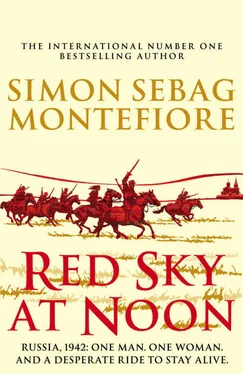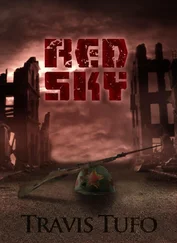It was July 1942 and the Red Army was falling apart, Stalin’s Russia was on the verge of destruction, and the distrust and paranoia of the Camps still gnawed at each of them. Having broken through enemy lines at a terrible cost, adrift on the endless blond sea of the grasslands, they had one more mission to pull off.
Benya tested the girth of his horse, Silver Socks: ‘Better to forget your pants and ride naked than forget your girth,’ the older man, Panka, had taught him. ‘A loose girth means a ride with the angels!’
They were ready. Their captain, Zhurko, gestured with a small motion of his head: ‘Mount your horses. Time to ride out.’
Prishchepa, his spiky hair gilded into a metallic sheen by the sun, had lost none of his easy, feral joy. Spurs chinking, he vaulted into the saddle, laughing, and his horse, Esperanza, as playful a daredevil as he, tossed her head with the game. Benya wondered at Prishchepa’s capacity for happiness, even here: wasn’t that the greatest gift on earth? To be happy anywhere.
He watched as Panka, who must have been at least sixty, laid a light hand on his mount’s withers and mounted Almaz without bothering with the stirrups. He had a slight paunch but he was sinuous, strong, effortless. Not all of them were so gentle with the horses and it showed. When Garanzha approached Beauty, she flattened her ears and rolled her eyes. All the horses were scared of ‘Spider’ Garanzha and no wonder; Benya was scared of him too. His lumpy, shapeless head looked as if it had been hewn out of wood by a wild blind man with an axe; his mouth was a tiny-teethed scarlet gash and he was covered from head to foot in long, straight black hair. He never rushed but moved with a hulking slowness that always stored the energy of concentrated menace. And then there was ‘Smiley’, the Chechen, who from a distance was lean with noble features and that prematurely grey hair which make Caucasian men so handsome – until he was happy enough or angry enough, and then, thought Benya Golden, you knew…
Benya was last, always last. Agonizingly stiff, his thighs were chafed and arse bruised by so long in the saddle. He had only learned to ride properly during his short spell of training, and now he placed his booted left foot in the stirrup and huffed as he pulled himself up and into the saddle.
‘Careful, Granpa!’ Young Prishchepa caught him by the shoulder and held him with an iron grip until Benya was steady.
Panka, whose white whiskers and topknot placed his youth before the first war, chewed a spod of tobacco and sucked on his moustache vigorously, usually a sign of amusement.
Men rode as differently as they walked and their horses each had life stories, charges and retreats, crises and triumphs on this frontier that their riders knew and understood, as if they were their children. And as they moved off, each whispered their own salutations. ‘ Klop, klop , graceful lad,’ said Panka to Almaz, his roan stallion, while Prishchepa leaned close to blow over Esperanza’s white-tipped ears, which perked forward and then flattened with pleasure. Benya, a Muscovite who had spent some of his life in Spanish cafés and Italian villas, chanted catechismic praise like a rabbi’s haunting prayers to Silver Socks, his high-handed dark chestnut Don mare with the white blaze on her forehead and white front legs that earned her the name. Silver Socks turned her gleaming neck round towards Benya, and he stretched forward, slipping his arms around her. He loved this horse as much as he had ever loved a person. Besides, he reflected, he had never needed anyone as much as he needed Socks now.
Captain Zhurko raised his hand, his shirt already stained with sweat, his peaked summer cap low over his spectacles. ‘If you’re scared, don’t do it,’ he called to his men. ‘If you do it, don’t be scared!’
For a moment the seven men looked out over the scorched steppe. Their faces were already coated with dust: dust was in their eyes, in their mouths and nostrils, in their clothes. Pungent eye-watering dust hung in the air as they rode over clover and lavender and meadow grass.
Captain Zhurko wiped his spectacles and stared out. ‘I was thinking about my son,’ he said to Benya, the member of the unit with whom he had most in common. ‘His mother tells him he doesn’t have to work at his studies. I blame her…’ How quaint it sounded to Benya to hear a man grumble about normal things amidst this pandemonium.
But Benya was thinking about the body. They had all seen it, understood what it meant and nobody said a word, no surprise, no questions. They had known him well, after all. But they knew death well too. In the Camps, death came fast as a breath. Bodies loomed dark out of the snow as the ice thawed – where they had fallen or been shot in the back of the head by a guard. Sometimes men walked with death on their shoulder for days: there was something about the glassiness of their eyes, the beakiness of their noses, the sunkenness of their cheeks, and they were dead in the morning lying in their bunks in the barracks with their mouths wide open. Benya knew they would not let the body with its tracks of brown-black blood spoil their concentration or distract them from their mission.
Zhurko was still talking about his son’s laziness – his refusal to study, heavy smoking, and his seemingly indefatigable self-abuse. Benya looked around him. His fellow mavericks might never be as at home in a family as they were in this unit. All across the steppe, on both sides, strange misfits had found a place in the hierarchies of this cruel chaos. Benya wondered if there had ever been a more terrible moment on earth than this one. Zhurko was the one straight man in this posse, the only one who, if he lived, could return to a normal job in civilian life, an accountant or manager, someone wearing a suit, the sort of guy you might see on the Moscow Metro swinging a briefcase. He was fair to the men and imperturbable under fire and it was a measure of his coolness that he did not bother to comment on what he had seen.
The plains were almost flat, broken up with bowers of willows and poplars but mostly they stretched forth, a wilderness of high grass sometimes swaying and rich with yellow-headed, black-faced sunflowers, the horizon interminable, the sky fast-changing from scarlet to yellow to lilac: a hazy, dusty, grainy luminosity. The sheer beauty of this vastness gave Benya a sense of floating helplessness that allowed him to live in the present and not try to understand anything other than his intimation that he was a weary man longing to stay alive for one more bewildering day.
In the distance, squadrons of tanks like steel cockroaches ploughed up the coffee-brown dust. They were heading towards the Don, and sixty miles beyond it lay Stalingrad.
In the ripped-open sky above, planes swooped through the haze, Yaks duelling with Messerschmitts. Close to them, a German Storch, watching the Russian forces, resembled a clumsy pterodactyl, Benya thought. The Nazi advance over the last few weeks had been so fast that the steppes were now chaotic. Whole Russian armies had been captured in German encirclements; many traitors had defected to the German side, others left behind on the steppes. Out there in the cauldron of blood it was not just German vs Russian, Nazi vs Communist but also Russian vs Russian, Cossack vs Cossack, Ukrainians against everyone, and everyone against the Jews…
On the roads and the open steppe, peasants with carts stacked with their paltry belongings trekked back or tramped forward, weary and stoical, confused by the advances and retreats of the soldiers. And in villages, woods and high grass, Jews were hiding, lost people who claimed to have witnessed things that sounded incredible in their maleficence. Far from their shabby Bessarabian villages or great Russian cities of Odessa and Dnieperpetrovsk, they fled alone, just darting from haystack to barn, seeking sanctuary.
Читать дальше












